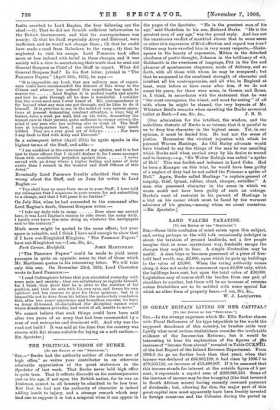THE POLITICAL WISDOM OF BURKE.
170 THE EDITOR OP THE " SPECTATOR." J
Sin,—" Burke had the authority neither of character nor of high office," so writes your contributor in an otherwise admirable appreciation of the great statesman in the Spectator of last week. That Burke never held high office is quite true. That it reflects discredit on his contemporaries and on his age, if not upon the British nation, for he was an Irishman, cannot in all honesty be admitted to be less true. But that he had not the authority of character is indeed adding insult to injury, and a strange remark which may lead one to suppose it is but a misprint when it can appear in the pages of the Spectator. "He is the greatest man of his age," said Shakelton to his son, Richard Burke. "He-is the greatest man of any age," was the proud reply. And has not the unanimous verdict of mankind shown that in some sense or other this expression of filial affection and regard was true ? Others may have excelled him in very many respects,—Sbake- speare in the beauty of expression, Milton in the detached aloofness of poetic thought, Johnson in the brilliancy of wit, Goldsmith in the sweetness of language, Pitt in the fire and glamour of spontaneous eloquence, mode of delivery, and so forth, with all those with whom he may be compared; but that he surpassed in the combined strength of character and intellect all his contemporaries, and all who, in England at least, went before or have come after him, if we do not count his peers, for there were some, in Greece and Rome, is, I think, in accordance with the statement that he ..was "the most courageous, the wisest, and most far-seeing" of all with whom he might be classed, the very keynote of Mr. Whitelaw Reid's remarks when unveiling the Burke memorial
tablet at Bath.—I am, Sir, &c., J. B. B.
[Our admiration for the intellect, the wisdom, and the matchless rhetoric of Burke is so intense that it is painful to us to deny him character in the highest sense. Yet, in our opinion, it must be denied him. He had not the sense of justice. Remember the virulent injustice with which he pursued Warren Hastings. An Old Bailey advocate would have blushed to say the things of the man he was assailing which Burke said when carried away by his desire to wound and to destroy,—e.g., "Sir Walter Raleigh was called ' a spider of Hell.' This was foolish and indecent in Lord Coke. Had lie been a Manager on this trial, be would have been guilty of a neglect of duty had he not called the Prisoner a spider of Hell." Again, Burke called Hastings " a captain-general of iniquity, thief, tyrant, robber, cheat, sharper, swindler." A man who possessed character in the sense in which we wrote could not have been guilty of such an outrage. Burke's want of restraint in his pursuit of Hastings is a blot on his career which must be faced by the warmest admirers of his genius,--among whom we count ourselves. —En. Spectator.]




























































 Previous page
Previous page